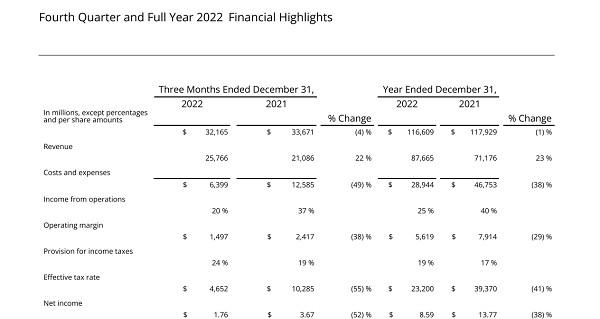Not long ago, Meta announced a financial report for the fourth quarter of fiscal 2022, which surprised the outside world. It shows that its revenue in the quarter fell 4% year-on-year to US$32.165 billion, and its net profit fell 55% year-on-year to US$4.65 billion. In the face of such performance, Meta also quickly opened a new round of layoffs and "cost reduction and efficiency increase".

In the earnings call, Meta founder and CEO Mark Zuckerberg said that 2023 will be Meta's "year of efficiency" and will focus on transforming Meta into a stronger and more flexible organization, such as cutting some middle managers, cutting projects that are not effective or important, and improving the implementation of priorities.
In fact, it is not surprising that Meta was the first to abandon, that is, the "live streaming goods" that even TikTok has not been able to play.
In August last year, Meta's social media platform Facebook (hereinafter referred to as "Facebook") announced that the live streaming function will be discontinued in October 2022. A few days ago, Meta's other social platform Instagram also said that it will cancel the "Live Shopping" feature that has allowed creators to directly tag products and promote links in live broadcasts in the past few years. In addition, the platform's homepage has also removed the shopping label, saying goodbye to the e-commerce business that has been tried for nearly three years.
It is not difficult to speculate that Meta's multiple platforms have successively launched the "live shopping" function, which is obviously related to the sharp decline in performance, and compared with the failed live streaming goods, it may focus on short video products Reels and Reels advertising. Previously, Zuckerberg revealed in an earnings call in the second quarter of 2022 that Reels' annual revenue has reached $1 billion, but its revenue generation efficiency is not as good as products such as Instagram Stories.
Although Meta has never disclosed its specific results until Meta completely downplayed its live streaming business, according to Insider Intelligence, social-based shopping is expected to account for only 5% of the US e-commerce market in 2022. If this data is true, it seems to indicate that the live streaming model has not gained momentum in the US market, far less than the domestic market size.
Looking into the reasons behind this, in addition to completely different consumption habits, mobile payments and inefficient and expensive delivery services in overseas markets are clearly among them. Furthermore, in the domestic market, social media and its e-commerce business, logistics, and payment have been deeply integrated, allowing consumers to complete the process from seeing the product to completing the purchase in seconds.
However, in overseas markets, functions and functions, platforms and platforms are more like "horizontal integration", and the transition between different scenarios is not so smooth. Therefore, in the face of such a situation, overseas brands and advertisers will also be more cautious in the face of live streaming on overseas platforms.
Back to Meta itself, concentrating resources on the development of short video business and meta-universe has made it inadequate, and with the change of the overall market environment, the intensification of competition, and the decline of advertising business, its net profit has also fallen sharply. As the basic plate of its business, Instagram has been questioned by users and creators for its redundant functions and too much like "TikTok".
As Instagram mentions in its support page, "this change will help us focus on products and features that provide the most value to users," such as feeds, stories, Reels, ads, and more.
Of course, Meta is not the only company that covets live streaming and is struggling in the e-commerce business. Last year, TikTok, which tested shopping functions in the United Kingdom and the United States, YouTube, which cooperated with Shopify to try to provide creators with a way to sell goods, and Amazon, which has repeatedly tried to hold live streaming activities at big promotion nodes, have not achieved too good results.
Even TikTok has not been able to replicate Douyin's successful experience in China in overseas markets, and a relevant person familiar with the matter revealed that "TikTok's e-commerce business in North America is progressing slower than expected, and the United States will basically not open small yellow cars, and cross-border integration stores are still the current mainstream."
The so-called cross-border integration store actually refers to making an independent website through Shopify, and binding it to TikTok with plug-ins, so that overseas users can find the window of the homepage through video content. In terms of logistics, TikTok can only cooperate with third parties at present, which has led to frequent problems such as lost parts and after-sales difficulties. In addition, TikTok, which previously tried to accelerate its e-commerce business, has also encountered an unprecedented "wave of departures" in the UK, and the strict work rhythm and different office culture seem to be a little "unsatisfactory" in the local area.
In fact, from TikTok's frequently blocked e-commerce business in overseas markets, it is not difficult to speculate that live streaming and social e-commerce are destined to be a long and dangerous road in overseas markets. More objectively speaking, when the "field" of overseas live streaming e-commerce has not yet been built, what is the "goods" and "people"?
Some insiders believe that such overseas platforms that try to bring goods live streaming actually have a common reason, that is, the advertising business is under constant pressure, and they are also facing a more intensified market competition pattern. At the same time, after the release of the iOS ATT framework, the accuracy and attribution of ad targeting continued to suffer, which also reduced the confidence of investors and brands, and further diversified advertising efforts.
Therefore, for such a heavy operation and heavy investment track as live streaming, Meta's comprehensive withdrawal may seem more sensible now.